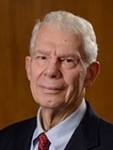Russell Leng Leng
James Jermain Prof. Emeritus of Political Econ. & Intl. Law

- Office
- Davis Family Library 355
- leng@middlebury.edu
- Office Hours
- RETIRED
Russell Leng taught full-time at Middlebury for 40 years, before retiring in 2007. He continues to teach an advanced seminar each spring term at Middlebury, and during the January term at the Monterey Institute of International Studies.Professor Leng completed his Ph.D. at American University, and his B.A. at Middlebury. He did post-graduate work at the University of Michigan, where he became involved in career-long research associated with the Correlates of War project.
Leng’s research on the Behavioral Correlates of War includes two books, Bargaining and Learning in Recurring Crises: The Soviet-American, Egyptian-Israeli, and Indo-Pakistani Rivalries, U. of Michigan Press, 2000, and Interstate Crisis Behavior, 1816-1980: Realism vs. Reciprocity, Cambridge University Press, 1993 as well as many articles in professional journals. He continues to do research on international conflict behavior, with a current focus on the use of negotiation in militarized disputes.
Publications
Bargaining and Learning in Recurring Crises: The Soviet-American, Egyptian-Israeli, and Indo-Pakistani Rivalries, Ann Arbor, MI: University of Michigan Press 2000.
“Cumulation in Q.I.P.: 25 Years After Ojai,” Conflict Management and Peace Science, 17 (Fall, 1999): 133-147
“Reducing Intergang Violence: Norms from the Interstate System,” Peace and Change, 24 (October, 1999): 476-504l
